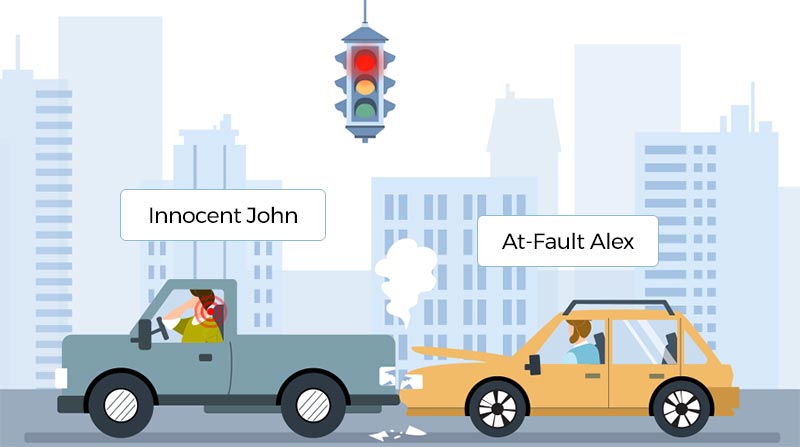Ridley Decision - What Happens When Innocent John is Rear-ended?
Our Montana car accident lawyers are well versed in the unique car accident laws in Montana and are here to help you.
All Articles
Posted: 11/19/2020
Ridley Series Motor Vehicle Accident Personal Injury

As discussed in an earlier article, in many ways, Montana motor vehicle accident ("MVA") laws are different from other states. As a general rule, under Montana law and as a result of the important Ridley court case, the at-fault driver's insurance company is required to cover accident related medical expenses and lost income before final settlement of the claim. Unfortunately, over the last several years, many medical bill collectors across Montana have used these insurer obligations imposed under the Ridley decision in a way that can ultimately jeopardize the injured victim's ability to be compensated for all of their damages.
What follows is the first in a series of articles, authored by our experienced Montana car accident lawyers that will discuss different scenarios where injured accident victims need to be aware of how their medical bills are being handled. Our goal with these articles is to inform our community and shed light on how Montana motor vehicle accident laws can impact those injured in an accident. We want to be clear, however, that we absolutely support and appreciate the great medical providers we have here in Montana. And, we further support efforts to ensure those same medical providers are paid for the care they provide to accident victims.
Because there are so many different insurance scenarios in the MVA context, we will discuss several hypothetical fact situations to help explain how an accident victim can best protect their ability to have medical bills and wages covered after an accident and preserve their right to an eventual recovery.
First Scenario - Innocent John is Rear-Ended
In this first scenario, we take a look at what happens to "Innocent John" when he is rear-ended by "At-Fault Alex" while stopped at a traffic light.

Assume the following about Innocent John's situation where the accident occured:
- Innocent John has a full-time job that pays him $48,000 annually;
- Innocent John has excellent health insurance through his employer (with a $3,000 deductible); and
- Innocent John has his own auto insurance with Medical Payments Coverage (with a $5,000 limit);.
- Innocent John has a serious neck injury requiring surgery due to the accident;
- Innocent John's surgery will cost $40,000 and he will be forced to miss 2 months of work (costing him $8,000 in wages).
Assume the following about At-Fault Alex:
- At-Fault Alex has only $25,000 in auto liability insurance coverage in the amount of $25,000 (that is Montana's mandatory minimum liability insurance requirement); and
- At-Fault Alex does not have any other source of recovery, such as personal assets, for Innocent John's accident related damages..
In this situation, how does Innocent John deal with medical bills and his lost wages?
Back to the accident scene. As Innocent John arrives at the ER, he is likely panicked and unsure what steps he needs to take. Often, a Patient Advocate, who has been hired by the hospital's billing department, will appear and attempt to gather information about the accident. The Patient Advocate's first goal is usually to obtain the auto insurance information, both involving At-Fault Alex and Innocent John. The Patient Advocate's next goal is to bill either (or both) of the auto insurers directly for any medical treatment. They usually refuse to bill Innocent John's own health insurance (even though he pays premiums to have coverage in this situation). At this early stage, before Innocent John knows more about At-Fault Alex's auto insurance coverage, we would recommend that he (or his spouse) insist that the Patient Advocate or medical facility bill his health insurance for any medical treatment. Here's why.
If the medical billing department sends the ER bill, followed by the surgery bill, to At-Fault Alex's insurer, the $25,000 in available auto insurance coverage will be paid directly to the hospital. That coverage will be depleted. Next, they will bill Innocent John's auto insurer and the Medical Payments coverage of $5,000 will be paid. What happens then?
At this point, the auto insurance is tapped because the total of $30,000 available has been paid out, but the hospital is still owed $10,000 (of the original $40,000 owed)! Further, when the hospital then bills the outstanding balance to health insurance, Innocent John will have to pay his $3,000 health insurance deductible. There will be no available auto insurance left to cover his deductible, lost wages, or for any compensation related to future medical care, pain and suffering, and other areas of loss.
Key Point: Someone in Innocent John's situation should provide the hospital's Patient Advocate with their health insurance information and request that his medical bills be sent to his health insurer, at least until the available auto insurance information is obtained.
How would this change if John had different insurance coverage?
If John had Medicare, Medicaid, or workers' compensation coverage, this situation still needs to be handled in a manner that protects the injured victim.
We are here to help.
We have extensive experience with MVA claims including those involving difficult medical billing issue when there is inadequate auto insurance coverage.
Contact our legal team if you have been in an accident and are having issues with the at-fault driver's insurance company covering your medical bills or reimbursing you for lost wages. We have assisted hundreds of clients who had issues with medical Patient Advocates insisting on billing auto insurance in circumstances where other insurance is available. The Ridley decision intended to protect Montana accident victims and we are here to assist with achieving that goal.
Follow and Subscribe for New Articles
Throughout our next motor vehicle accident series, our car accident lawyers will discuss different insurance scenarios with this type of MVA to further explain how the Ridley decision can do what it was intended to do -- protect Montana accident victims. Our hope in doing so is to detail how Montana motor vehicle laws impact your claim and prepare you or a loved one to obtain the medical care needed while increasing the chances of maximizing your financial recovery for damages caused by an accident that was not your fault.
Sign Up for More!
Join our community and subscribe! Sign Up for Exclusive Legal Articles and Resources.